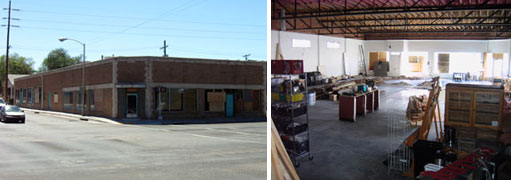The typical formula for theatergoing is pretty simple in the States: You buy a ticket, are ushered to a seat, eat your Toblerone, watch the show and are ushered out. Aside from clapping, the experience is about as interactive as a game of solitaire.But the co-founders of q-Staff Theatre, Sandy Timmerman and Richard van Schouwen, have been working hard to turn that notion on its head. And they’ve been at it for 20 years. Inspired by a festival they participated in in Budapest in the mid-’90s, the pair have used a European model, presenting their theater as a crossroads between performance space and social space. "Every single theater had a café attached to it, a place where people would meet up to two hours before the performance even began, have drinks,” and meet friends, says van Schouwen of his Euro trip. After the performances, both theatergoers and performers would hang around for just as long, mingling and discussing what had occurred onstage. "What it created was this culture of theatergoing that was way more than the product of the performance.”And now q-Staff has a new, 6,500 square-foot space to showcase that model. But getting there wasn’t easy.It began back in the ’80s at IU-Bloomington, where the pair studied theater. Graduation sent them down different paths—she to the Peace Corps in Ecuador; he to his hometown Chicago to give that theater scene a shot. By 1993, Timmerman had ended her Peace Corps service, and the Chicago thing hadn’t panned out for van Schouwen. "I’d sold everything and bought a VW bus," he says, "and took my guitar and my dog and this van and just struck off for places unknown." He headed Southwest, attempting both to scope out various theater scenes and survive the winter in climes where mobile living wasn’t a death wish. He found what he was looking for in Albuquerque. "Of all the places I went through, it was really no contest." Timmerman took the leap of faith and followed.They spent the mid-’90s working at a coffee shop and doing productions with various companies, eventually joining up with the Riverside Repertory Theatre Co. (which later became Tricklock). Their breakthrough came in a production of The Seagull , the success of which allowed them to tour the East Coast. This segued into an exchange program at the theater festival in Budapest, which led to further European travels. That’s when things started falling in place.Created as a transient company in 1999, and lacking a home base, q-Staff’s first performance took place in the house and backyard that Timmerman and van Schouwen still share on Stanford. That piece, Stargarden , was a meditation on domestic living, and the “interplay of how the way you set up your house sets up you,” van Schouwen says. Timmerman adds that Stargarden got so popular that patrons "were sitting on my cabinets and looking through the windows." They performed that piece off-and-on for the next three years and started putting on performances at their day-job space, Winning Coffee.They eventually purchased Winning in 2004, along with their third partner, q-Staff’s technical director, Bryan Jabaay. Later that year, they rented out a small storefront on Central across from Hiland Theater in the city’s historic theater corridor. Intended originally as a training space, it became q-Staff’s home for the next six years.Things were going smoothly at that venue, but right before the opening of a large production in that space early last year, their landlord rented the space next door to a dance company. Conflicting schedules and thin walls meant that someone had to leave.So on April 1, 2010, with cash earned from Winning Coffee, some grant money and a major loan from a supportive patron, Timmerman, van Schouwen and Jabaay purchased two gutted, adjoined buildings at the corner of Broadway and Lead. They also bought a building in back of the theater to provide additional parking and to rent out as a revenue source.A few weeks ago they put on their first performance, an out-of-house production of The Pajama Men, which ran for three sold-out weeks.They have no upcoming shows planned, as the main focus right now is to transform the audience area from 100 to 300 seats, build a café, add a gallery/social space and create a live-in practice space for members of the company. A tall task, and one without a concrete timetable, but one that Timmerman and van Schouwen are optimistic about. "We’re having to be really open and flexible right now with the main project, which is getting the building up and running," van Schouwen says. "But we’re keeping our creative life going through a lot of collaborations and training projects."




